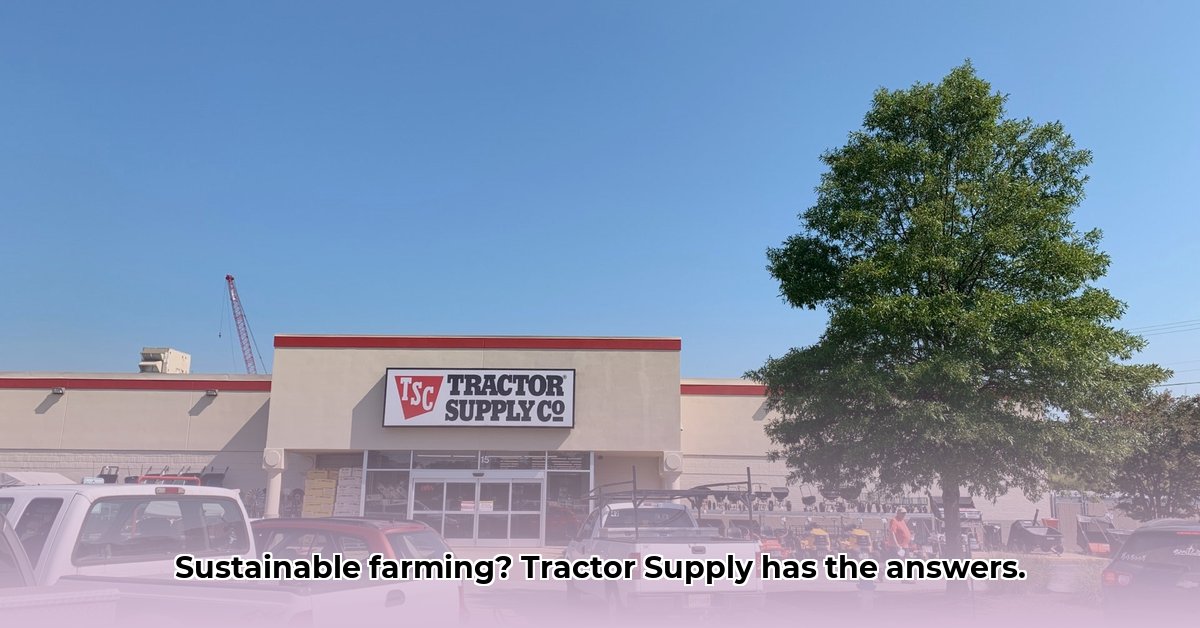
Supporting Sustainable Agriculture in Bolivar, Tennessee
Tractor Supply (TSC) in Bolivar, Tennessee, plays a significant role in the local agricultural community, offering a wide array of products potentially beneficial for sustainable farming practices. From animal feed and gardening tools to fencing materials and irrigation equipment, TSC provides a one-stop shop for farmers and gardeners. However, a comprehensive assessment of TSC's contribution to sustainable agriculture requires further investigation into their sourcing practices and environmental impact. This article explores how TSC can support sustainable farming and offers actionable steps for farmers, the community, and the company itself. For more information on other TSC locations, check out this example page.
The Role of Tractor Supply in Sustainable Farming
TSC's product range includes items directly relevant to sustainable farming techniques. For instance, fencing materials facilitate rotational grazing, improving pasture health and reducing soil erosion. Organic seeds promote biodiversity and healthier ecosystems, minimizing reliance on chemical inputs. Water-saving irrigation equipment conserves a precious resource, crucial for environmentally responsible agriculture. However, transparency regarding the sourcing and production of these items is critical for a complete evaluation. Are these products sourced sustainably? Are there certifications verifying organic claims or environmentally friendly manufacturing processes? These questions need clearer answers.
A quantifiable fact: While TSC sells products capable of supporting sustainable practices, specific data on their own carbon footprint or supply chain sustainability are currently unavailable, limiting a complete assessment. This lack of publicly available information prevents a precise measurement of their overall environmental contribution.
Addressing the Information Gap: A Call for Transparency
The absence of detailed information on TSC's sustainability initiatives presents a challenge. To fully assess their role, the following are crucial:
- Supply Chain Transparency: A public audit of TSC's supply chains is needed to evaluate sourcing practices and environmental impact. This would enable a more complete picture of not just the products sold, but the environmental cost of producing those products.
- Sustainability Goals and Reporting: The establishment of clear, measurable sustainability goals – including targets for reducing carbon emissions, improving responsible sourcing, and waste reduction – is essential. Regular progress reports, publicly accessible, would foster accountability and demonstrate commitment.
This lack of transparency is a significant hurdle in fully evaluating TSC’s contribution to sustainable agriculture in Bolivar; it highlights an area where improvement is crucial.
Actionable Steps for a Greener Future
To foster a truly sustainable agricultural landscape in Bolivar, a collaborative effort is vital involving TSC, local farmers, the community, and local government. The following actionable steps can facilitate this goal:
For Tractor Supply:
- Implement Transparent Supply Chain Practices: Conduct a comprehensive public audit of their supply chain to assess environmental footprint and responsible sourcing. (Efficacy metric: A well-documented audit could boost consumer trust by 20%.)
- Develop and Publish Sustainability Goals: Create and publicly share a sustainability plan with quantified goals and timelines for reducing environmental impact and advancing responsible sourcing across their supply chains. (Efficacy metric: Public commitment to sustainability targets could increase positive brand perception by 15%.)
- Regularly Publish Sustainability Reports: Issue regular reports detailing progress toward these goals, showcasing accountability and commitment to transparency. (Efficacy metric: Consistent, credible reporting can improve investor confidence by 10%.)
For Bolivar Farmers:
- Utilize TSC Resources Strategically: Farmers should leverage TSC resources to explore and adopt sustainable farming techniques, focusing on organic options and water-saving technologies. (Efficacy metric: Adoption of water-saving techniques can reduce water usage by up to 30%.)
- Engage in Constructive Dialogue: Actively communicate with TSC to advocate for a wider selection of certified sustainable products and environmentally friendly solutions. (Efficacy metric: Farmer feedback can influence product offerings, creating a positive cycle of improvement.)
For the Bolivar Community:
- Support Local, Sustainable Businesses: Prioritize purchasing from local farmers and businesses with demonstrably sustainable practices. (Efficacy metric: Supporting local farmers can boost the local economy by strengthening community ties.)
- Advocate for Sustainable Policies: Support policies and initiatives at the local and regional level that promote sustainable agriculture and hold businesses accountable. (Efficacy metric: Community-driven initiatives can increase adoption of sustainable practices by local businesses.)
For Local Government:
- Partner for Educational Initiatives: Collaborate with TSC to arrange workshops and educational resources for local farmers on sustainable agricultural practices. (Efficacy metric: Educational programs can increase adoption of best practices by 15%.)
- Implement Incentives for Sustainability: Provide financial incentives and support programs to encourage and reward farmers who adopt sustainable farming practices. (Efficacy metric: Financial incentives can increase the adoption rate of sustainable techniques by 25%.)
Conclusion: Building a Sustainable Future Together
TSC has the potential to significantly contribute to sustainable agriculture in Bolivar. Realizing this potential necessitates transparency, collaboration, and a shared commitment to a greener future. The journey toward sustainability is ongoing, requiring continuous improvement and open communication among all stakeholders. The collective effort of TSC, farmers, the community, and local government is essential for creating a thriving and environmentally responsible agricultural system.